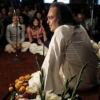
Why Was Adidam Labeled a Cult?
How Adidam Measures Up as a Cult
In the mid-1980s some students became upset by Avatar Adi Da’s method of teaching. In a handful of cases their difficulties were exploited by attorneys and exaggerated or distorted by journalists. The resulting coverage made Avatar Adi Da and Adidam a target of public ridicule and accusations of cultism.
It is true that Adidam is a small, new, non-mainstream spiritual movement. However, scholars of new religious movements have now abandoned the word “cult”, because of the many negative stereotypes and misunderstandings that it promotes towards religious minorities.
Compared to some of the most common stereotypes of cults, Adidam does not brainwash people, is not dangerous or harmful, does not take most of people’s money, does not pressure people to join, and does not prevent people from leaving. Instead, it encourages critical thinking, teaches compassion and tolerance in all relationships, allows people to engage the practice at the level they choose, and calls for tithing of 5 to 15% of income depending on one’s level of participation and financial means.
The Reality-Way of Adidam is an esoteric spiritual practice established by Avatar Adi Da for people to transcend their limited states of awareness and behavioral patterns, and to realize Truth. Avatar Adi Da himself criticized our tendency to cultic or childish thinking, and always encouraged critical examination and mature human responsibility. Each person becomes a student by his or her own free choice and is welcome to leave at any time. In fact, Avatar Adi Da himself characterized Adidam as hard to get into but easy to get out of
.
I Speak critically of the conventional (or childish, and, otherwise, adolescent) orientation of “Guru-cultism”. Such cultism is a tendency that has always been present in the “religious” and Spiritual traditions of humankind. Anciently, and in the present time, both true Spiritual Masters and ordinary Wisdom-Teachers have been “cultified”, and (thereby) made the merely fascinating “Object” of a self-contained popular movement that worships the Spiritual Master as a Parent-like Savior, while embracing very little of the significant Wisdom-Teaching of the Spiritual Master.
—Avatar Adi Da Samraj
The Aletheon
The Reality-Way of Adidam has not always been fully understood or responsibly practiced by all devotees, especially during Avatar Adi Da’s early teaching years. Certain individuals—some in leadership positions—acted in ways that offended or upset others. Some devotees behaved immaturely and unkindly, or made naive, unwise decisions that affected our friends and families. This has sometimes led to unfortunate situations that could have been handled better, and for all of us this is a matter of regret. However, any “cult-like” behavior by students should be seen as evidence of each individual’s relative immaturity as a practitioner and not as a reflection of the Reality-Way of Adidam as Avatar Adi Da gave it. The integrity of Avatar Adi Da’s teachings stands apart from the ability of practitioners to fulfill it.
Avatar Adi Da’s address to humanity came from his lifelong intention of communicating the Truth of human existence—of uncovering the essential driving forces of human limitation and suffering and revealing the means to go beyond those forces. Avatar Adi Da’s legacy is a gift for people of all cultures, faiths, and traditions.
Mature Spiritual Practice vs Childish Cultic Behavior
Throughout his teaching, Avatar Adi Da constantly emphasized the difference between mature spiritual practice and mere childish cultic behavior. He expected his students to practice profound right-life disciplines and discriminative intelligence rather than being merely fascinated by him or creating a personality cult around him. He always criticized the tendency to relate to the spiritual master childishly as a parent-like authority figure or cult leader, which hinders spiritual growth. He never encouraged hopeful, enthusiastic believers who simply wanted to be glamorized and consoled by association with him.
Over the years, you have all heard Me Speak about cultism in negative terms. I have Criticized the cults that people form around religious leaders (and even around true Spiritual Masters), as well as the cultic attachments that people create with one another. There exists a certain hyped enthusiasm to which people are attracted. And when those people accept all the dogmas with which that particular group makes itself enthusiastic, they maintain themselves as opponents of the world and lose communication with the world in general, and with the processes of life.
To Me, that enthusiasm is bizarre. There is something about the capability of individuals for that kind of enthusiasm that makes my skin crawl. It is a kind of madness. Gleeful enthusiasm has nothing whatsoever to do with this Way and with the value that I can have for you personally. It has nothing to do with it!
My purpose in associating with people is not to entertain them, not to be believed in, not to be worshiped in this nonsensical fashion, so that you are never changed, but only consoled. My purpose in dealing with people, My purpose in teaching, is to make it possible for you to duplicate what I have done—to be in Communion with Me, to be Spiritually intimate with Me, so that you yourself may live and fulfill this practice and make a community with one another out of the True Happiness of mature Divine Living.
Everything that is negative about cultism is specifically criticized in this teaching. I do not want your enthusiasm to be superficially generated by the books I write [or by your association with me]. I want you to consider the matters [my teaching] those books contain—consider yourself very critically, very directly and rigorously. When you come to the point of insight into your own game, into your childishness and adolescence, you will be able to take up this Spiritual practice and the forms of adaptation that mean continued growth beyond your present stage of life maturity.
I refuse to console individuals by telling them that all they need to do is believe in Me, that all they need to do is practice some silly little technique and they will Realize God, no matter what they do otherwise. I am not the slightest bit interested in your gleeful applause. I want you to understand yourself and to practice true heart-Communion with Me. I want you to truly live the Way that I have Revealed and Given to you. In order to do that, you must grow up. You must stop being naïve about the communications of silly people, all the aggressiveness of media campaigns, and all the things that fundamentally work against the higher acculturation of human beings.
—Avatar Adi Da Samraj
December 16, 1978
Critical Thinking Encouraged, Not Mere Belief
David R. has been a student for more than 30 years:
Avatar Adi Da always addressed any of our tendencies to behave in a cult-like manner. He always showed us how that type of behavior prevents real growth in either ordinary human life or in esoteric spiritual practice.

Avatar Adi Da always called us to exercise critical thinking and discriminative intelligence instead of mere belief:
The fundamental disposition of “consideration” is what I Call all of you to embrace in My Company. The by-Me-Given practice of “consideration” necessarily involves the devotional Yoga of Communion with Me, but also the exercise of the natural human functions of intelligence—to observe, examine thoroughly, understand what is going on in your case, such that (having observed and understood it) you can do something different about it, you can discipline it differently and (thereby) serve further “consideration”. Such “consideration” is, essentially, what I Call you to do at the beginning of your practice of the Reality-Way of Adidam.
—Avatar Adi Da Samraj
My “Bright” Form
David R. describes his experience:
In my life with Avatar Adi Da I have learned to employ clear discerning judgment in relation to various worldviews in general and indeed to every aspect of my personal life. Rather than just believing something or taking it at face value, I first test and prove its validity in my own experience. This was always encouraged by Avatar Adi Da himself.

Regalia P. disagrees with labelling Adidam a cult:
There are a lot of intelligent people in Adidam, people who pursue knowledge, critical thinkers—Adi Da cultivated critical thinking and the faculty of discrimination: “Don’t just believe this, test and prove it in your direct experience”.

Joe T. shares his experience of the Adidam community:
I have been a university professor for over 46 years and, consequently, I have had to be professionally critical and broadly discriminating in my judgment for my students and my colleagues. Many of my personal and successful professional friends are practitioners of Adidam and I find them to be among the most serious, intelligent, and discriminating people I know.

One Person’s Cult is Another Person’s Religion
Most observers of the cult phenomenon note that the term “cult” has negative connotations that trigger images of mindless fanaticism and that predisposes people to reject the “cult” outright. In his study of the cult controversy, scholar of new religions James R. Lewis writes:
[The depiction] of “cults” as weird groups capable of breaking out into some form of sociopathic behavior at any moment . . . is deeply flawed. . . . The “reasoning” at work here is the same illogic of stereotyping from which many minorities have suffered. . . . People talk as if there is an objective category of groups called “cults” that can be distinguished from genuine religions. In this commonly accepted view, cults are by definition socially dangerous false religions. [But in fact], “cult” is a socially negotiated label that often means little more than a religion one dislikes for some reason. To certain conservative Christians, for example, a “cult” is any religion that departs from a certain traditional interpretation of [biblical] scripture. Alternately, ultra-conservative Christians, who take a strictly fundamentalist approach to scripture often appear “cult-like” to many mainline Christians. In other words, one person’s cult is another person’s religion.”
—James R. Lewis
Odd Gods: New Religions and the Cult Controversy, Prometheus Books, 2001
Many Kinds of Groups Exhibit Cultic Tendencies
Clearly, there have been instances of abuse and tragedy in the formation of new religious and spiritual movements, both in our time and throughout history. In fact, organizations of all types can exhibit cult-like behavior, not just small religions, but also political parties, businesses, and even fan clubs. Cultism—in the negative sense of gleeful, enthusiastic dependency on an authority figure, as well as the attitude of exclusivity that makes all “others” into “outsiders”—is a tendency present in many individuals and groups.
Terry H. is a former Episcopal priest and has worked as a CEO after becoming a devotee of Avatar Adi Da:
Abuse of power can happen in any field—in politics, business, religion, families, relationships—it seems rampant today. That was never my experience with Avatar Adi Da. The organizational structures created by Avatar Adi Da reinforce the principles of cooperation and personal responsibility.

In addressing this persistent human tendency towards cultism, Avatar Adi Da wrote:
Yet un-Enlightened (or, otherwise, not yet Most Perfectly Enlightened) people are ego-possessed. Therefore, egoity is the “disease” that all the true Spiritual Masters come here to cure. Unfortunately, those who are merely fascinated by Spiritual Masters are, typically, those who make (or, at least, transform) the institutions of the Way of their Spiritual Masters. And true practitioners of any “religious” or Spiritual Way are very hard to find, or develop. Therefore, “religious” and Spiritual institutions tend to develop along lines that serve, accommodate, and represent the common egoity—and this is why the esoteric true Teachings of true Spiritual Masters tend to be bypassed, and even suppressed, in the drive to develop the exoteric cult of any particular Spiritual Master.
—Avatar Adi Da Samraj
The Aletheon
Read further statements by Avatar Adi Da addressing cultism.
An independent study Adidam, Controversy, and Former Members by James R. Lewis shows that the vast majority of ex-members of Adidam have no complaints, and seem to appreciate and value their experience as a student of Avatar Adi Da. Most state that their involvement with Avatar Adi Da and Adidam influenced their lives for the better.
Helen W. shares the process that took place with her family after she became a student:
After I had been a practitioner in Adidam for several years, I came home for the Thanksgiving holiday. In the course of a casual conversation, my mother, who has been devout in her religious practice her whole life, said, “We are so grateful to Adi Da for the change in your character!” I had been pretty wild and unstable before I met Avatar Adi Da. When she was giving the blessing for the meal, she said, "Thank you God, thank you Jesus, thank you Buddha, thank you Mohammed, thank you Adi Da!"
When I moved to the sanctuary in Fiji, my sisters did not want to speak to me again. They felt I had betrayed the family. A few years later, when I returned to take care of my mother, they cautiously allowed it, and in a very short time they were astonished by the love and attention I was giving my mother. They would comment, ‘You are so different! You are so kind. All you do is serve others! What happened?’ My sisters and I are very close again, as we were before.




